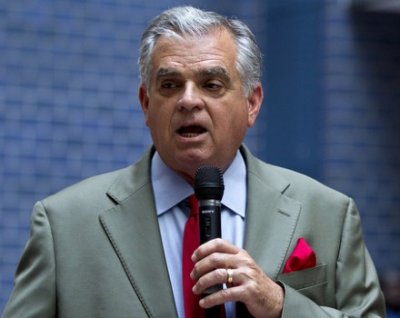
Former U.S. Transportation Secretary Ray LaHood. (Photo: thisisbossi with Flickr Creative Commons License)
Former U.S. transportation secretary Ray LaHood urged leaders to consider following Virginia’s lead and rethink transportation funding at a panel discussion in Baltimore last week.
LaHood, a 36-year public servant, proposes a higher federal gas tax to fund nationwide projects, but also suggested that the solution for a broken transportation system could be something like what Virginia did when it moved from a gas tax to a wholesale sales gas tax. By taxing a percentage of wholesale, legislative leaders would not need to make controversial votes (like the Maryland General Assembly’s move last year to increase the gas tax) in order to help transportation funding keep up with inflation.
“These are innovative approaches,” LaHood said.
Six panelists offered different solutions to the problem at the Greater Baltimore Committee’s seventh annual transportation summit. Opinions ranging from cutting federal funding allocated for local infrastructure to upping taxes all made the list of proposed fixes.
Maryland’s grade at C-
Current Maryland federal transportation funding is stretched over a number of hefty projects, with the state infrastructure receiving a grade of C- by latest report published with the Maryland Section of the American Society of Civil Engineers.
Emily Goff, a transportation policy analyst for The Heritage Foundation, said solutions should include “… adding capacity where demand exists. Reducing traffic congestion. Improving infrastructure and of course, improving mobility and safety for the people using it.” But, she added, simply hiking taxes won’t solve the problem.
LaHood, who worked under President Barack Obama, spoke highly of Maryland’s federal delegation in Washington.
“It’s not from lack of leadership on your part, in your state…in your city. You have good people,” he said. “Both of your senators are good strong people. They believe in many of the things you believe in. Your delegation works hard.”
But he said there is work ahead: “We can do better, and we need to do better.”
Delaney’s plan would use bonds raised from corporations
U.S. Rep. John Delaney, a Democrat who represents Maryland’s 6th district, pitched his solution to the problem, but LaHood said it didn’t go far enough.
Delaney’s bipartisan bill has been one of his signature legislative priorities since being elected in 2012. He is proposing to forgo the traditional route of relying on Congress to gather funding and instead utilize low-interest bonds purchased by U.S. corporations. It also seeks to bring home some of the $2 trillion U.S. corporations have earned overseas, giving them credits as incentives to purchase bonds that would be used to build infrastructure.
“There’s no question that every company would be willing to pay something to bring their money back” if there was some incentive, Delaney said.
Delaney, representing the Washington D.C. suburbs of Montgomery and Frederick Counties and all of Washington, Allegany, and Garrett Counties began his freshman term rolling out the bill. It received national attention for its unique approach to solving correlating problems: provoking U.S. corporations with money stashed overseas to invest right here at home and funding transportation with a traditional source seemingly on its last leg.
Delaney’s plan also includes creating a $50 billion federal fund to bankroll loans and leverage private investment for transportation and other infrastructure. The fund, proposed to lead to $750 billion in infrastructure financing, would be used to ensure the repayment of the infrastructure loans.
LaHood was skeptical it would solve the problem.
“Congressman Delaney’s bill is a good bill, and it’s a good approach. But it’s not enough,” LaHood said.
Transportation consultant wants to eliminate scramble for funding
Alan Pisarski, a transportation consultant, said, “I’m not scrutinizing Congressman Delaney, I think his approach has a lot of merit. Of course I’ll follow that with a but…finance ain’t money. We keep coming up with all these ways to come up with a loan, but there is no financial backing to cover it.”
Pisarski, whose solution to the crisis included alleviating the “constant scramble for funding,” also suggested evaluating the reliability of the nation’s public officials and transportation agencies.
“A big part of the problem is the loss of credibility of public officials and transportation agencies,” said Pisarski. “Unless you have a vision, unless you have a plan and you tell people what you’re going to get from the money, simply focusing on, ‘We’re broke, we need money’ is not going to work.”
Most speakers also expressed the need to stimulate economic growth while fixing years of degradation.
Stephen Sigmund, executive director of Global Gateway alliance, described the nation’s radar system as “outdated” explaining that the audience has “better GPS systems in your pocket.” Sigmund used the 75-year-old system to convey the necessity for infrastructure funding continues.


